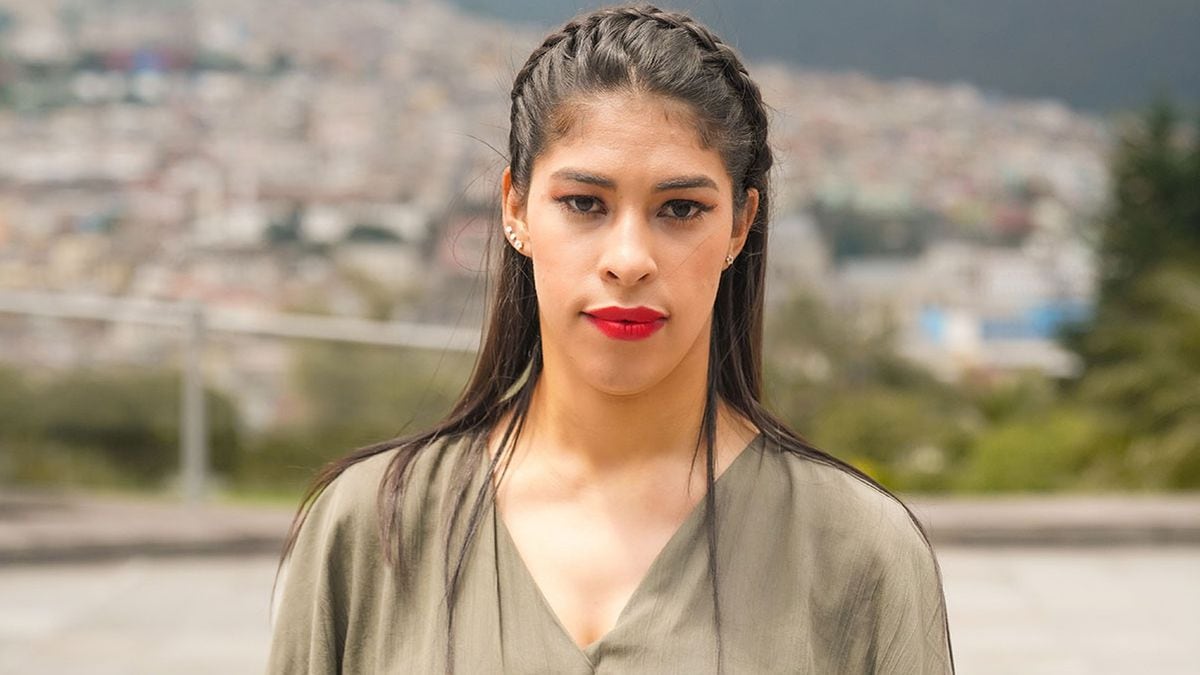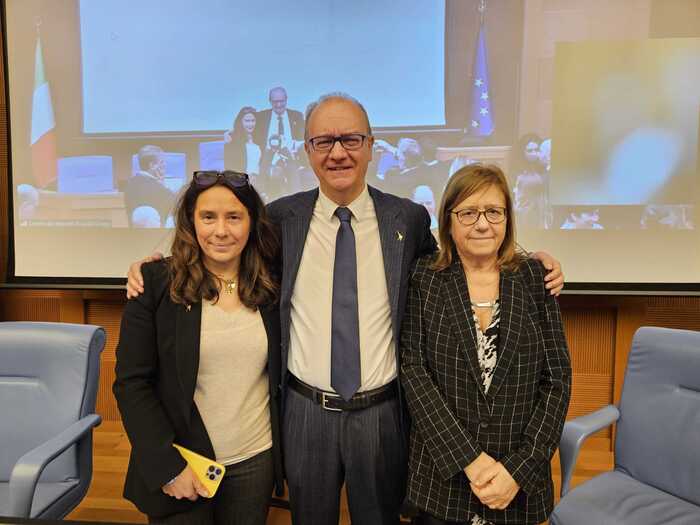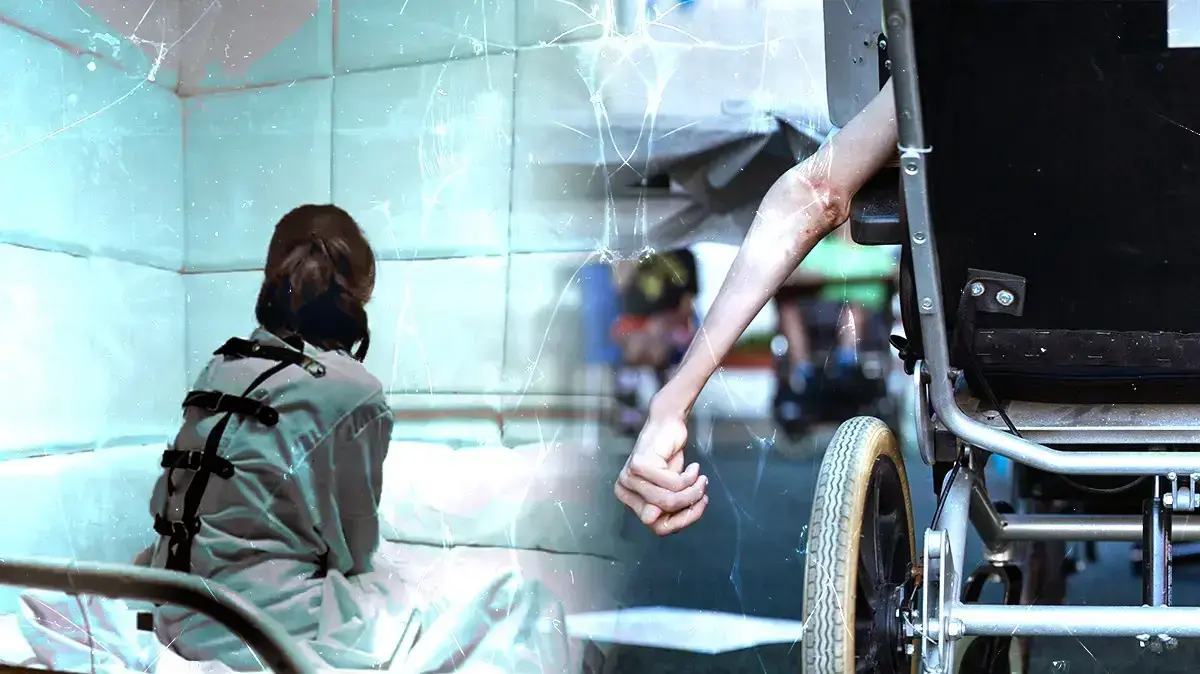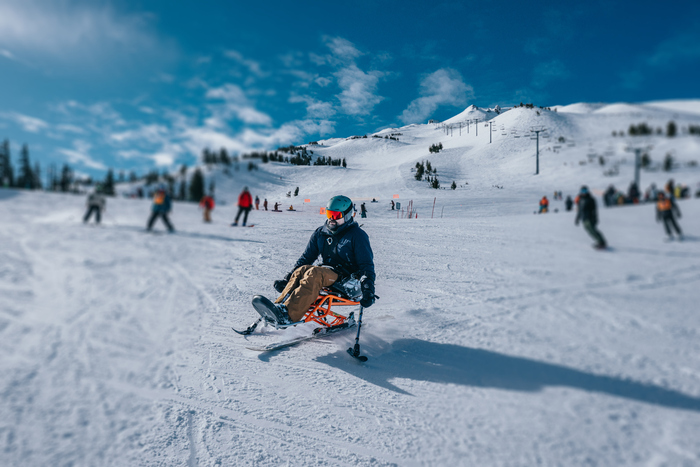Irene Valerezo in an image from UNFPA's 'Wanted: A World for a Billion' exhibition to demand equal rights for people with disabilities.Lauren Anders Brown (UNFPA)
Irene Valarezo (Santo Domingo, Ecuador, 29 years old) is a source of experiences about the difficulties that people with disabilities face to be recognized as the owners of their bodies, especially regarding their sexuality.
The barriers are physical and social, she explains herself.
“When my gynecologist tells me that I have to have a mammogram, they always do an
echo
, which I know is not the same, but the mammography machine is not adapted”.
The device is not suitable for performing the test because this Ecuadorian woman has cerebral palsy.
But the biggest wall she has run into is the stigma.
“I take contraceptives, obviously as a precaution, but also because I have an acne problem;
and a few days ago I told my mother to buy them because I ran out, and my mother looked at me surprised: 'Do you take them?'
And I replied that we are not in the 19th century, ”she says, smiling.
“This is in a family with training and knowledge on the subject, but imagine in one with other concepts... It is difficult for them to see us with the ability to decide and for us to want to experience our sexuality.
They see us as children, they infantilize us.
Many people still believe that we are asexual beings.
“The stigma is the worst because many people with disabilities are considered passive.
They are told that someone has to take care of them.
They don't have any autonomy,” agrees Kartik Sawhney, co-founder of the Global Network of Disabled Youth.
“In the developing world, but also in many developed countries, people with disabilities do not have enough information about sexual health and do not feel comfortable talking about it or having to discuss it with their carers, as it is a sensitive issue” .
In his opinion, this lack of knowledge of their rights places them in a situation of greater vulnerability to suffer gender violence, genital mutilation, abuse, unwanted pregnancies, forced sterilizations.
“A lot of things like that, which are very frequent,
The data proves him right.
Children with disabilities are three times more likely to suffer sexual abuse and women up to 10 times more likely to suffer gender violence, according to data from the United Nations Population Fund (UNFPA).
"Many endure coercive health practices, such as forced sterilization and abortion, as well as abusive treatment," denounces Natalia Kanem, executive director of the organization, in a statement on the occasion of the International Day of Persons with Disabilities, which is celebrated every 3 from December.
Article 25 of the Convention on their rights (2006) establishes that they should "enjoy the highest possible level of health without discrimination", the reality, however, is that "few countries provide sufficient quality services" to the collective, warns the World Health Organization (WHO).
They are three times more likely to be denied medical care.
And when they do, it is very common for them to be treated badly: four times more than any other patient.
And sexual health services are no exception.
More than one billion people - around 15% of the world's population - live with a disability
Graduated in Political Science, Master's in Social Inclusion from the University of Barcelona, athlete and activist, Valarezo works as a UNFPA consultant within the framework of the
We Decide program
(we decide).
Its objective is that the sexual health programs of the agency include those who live with a disability, so that all know (and exercise) their rights over their bodies, not to suffer abuse, to control their maternity and access to modern contraceptive methods if they want it.
This involves having adapted educational materials, the removal of architectural barriers in clinics and the training of medical personnel.
For this, the organization has only one donor: the Spanish Cooperation Agency, which saw the opportunity to support an initiative in line with its human rights and feminist approach.
They have started with Ecuador, Morocco and Mozambique, with an endowment of 3.8 million since the project was launched in 2016. "We would like others to join in order to increase the number of countries",
wishes Leyla Sharafi, gender adviser at UNFPA's human rights department.
“There is a misconception that these people don't have sex or that they shouldn't have relationships, or that they don't need to think about access to contraception or family planning.”
More than one billion people—around 15% of the world's population—live with a disability.
“We are not such a small minority, we are a fairly large minority”, ironically Valarezo.
With this argument, he calls for more attention to the collective, but above all, more voice and vote.
His effort is not only to eliminate architectural barriers in health centers (“but adequate ramps, not a mountain of cement as they do here in Ecuador”, he laughs) but also that the language change and, with it, the way of considering people like them.
“All the taboo around sexuality.
For example, whether or not you want to start a family.
It has to do with our autonomy and legal capacity.
But the idea persists that we are going to reproduce people who have difficulties or who are not going to be productive in their lives.
I also want to have a baby and not have it look weird.
We can plan it with the couple, obviously, because we don't have to be irresponsible either, ”she reasons.
In this sense, Valarezo calls for more training for those who decide to be mothers, especially for those who live with an intellectual disability.
"It is not enough that we feel ready to have a child, but we have to know what bringing a child into the world entails, the responsibilities."
And get anyone, living in the city or in a rural area, whatever their condition,
Míriam Císcar, head of AECID's sectoral cooperation department, emphasizes that 70% of women with disabilities live in rural areas.
“This exposes them to higher illiteracy rates, fewer chances of going to school and finding a job.
We are talking about people with a high degree of vulnerability.
But they may want to be in control of their sexuality: not have children or have them.
Not to be raped or terminate their pregnancy if they are.
They have to be able to tackle all of this by their own decision”.
there are solutions
Kartik Sawhney, co-founder of the Global Network of Youth with Disabilities, is working to improve the accessibility of UNFPA sexual health educational materials and resources for people with disabilities.
With the support of
We Decide
, his organization is developing a platform with information on rights, sexuality and services that the group has available in case they need help.
It is not being easy, he confesses, because the conditions are very heterogeneous and they want to guarantee that usability is equitable.
“We are trying to harness technology to connect people with disabilities with each other and make them aware of the resources available to them.
In audio, video, simplified text.
Whatever they prefer, ”she details.
They are still refining the pilot project.
One of the challenges is to ensure that it is not only available on the Internet.
“If we do that, we are excluding a large part of the community.
In our network there are organizations from countries like Pakistan and Bangladesh, where around 60-70% of people with disabilities do not have smartphones or internet access.”
For this reason, they are thinking of applications based on text messages, calls, or radio.
“So that everyone can participate in the community and learn from UNFPA documents, and in turn have their perspective reach higher levels than the UN.”
You can follow PLANETA FUTURO on
,
and
, and subscribe
here
to our 'newsletter'
.


/cloudfront-eu-central-1.images.arcpublishing.com/prisa/WPWCSHOWPNB4ZHMQCKZJHXPMOM.jpg)
/cloudfront-eu-central-1.images.arcpublishing.com/prisa/7QVPDOHXUJECPHX3SFFN3HDV2U.jpg)





